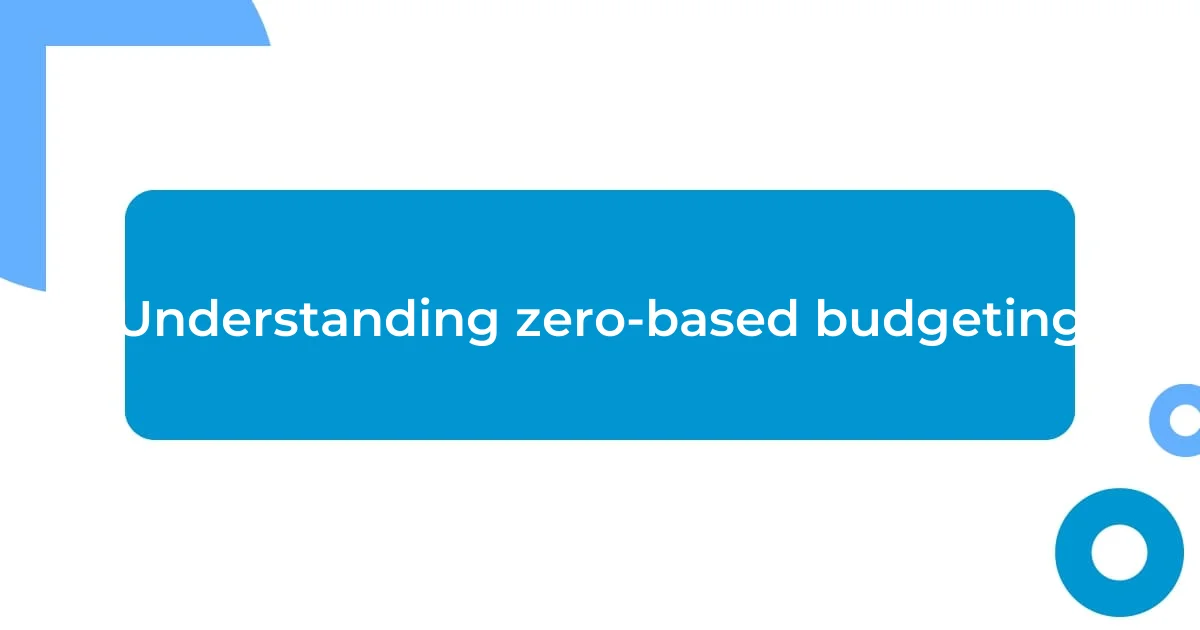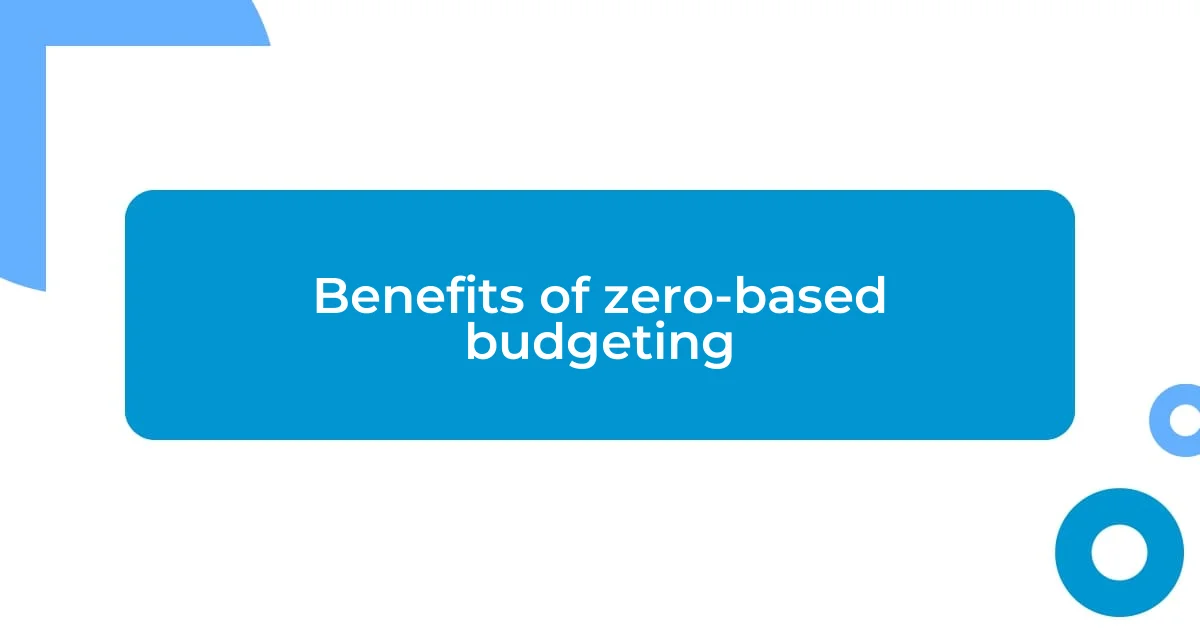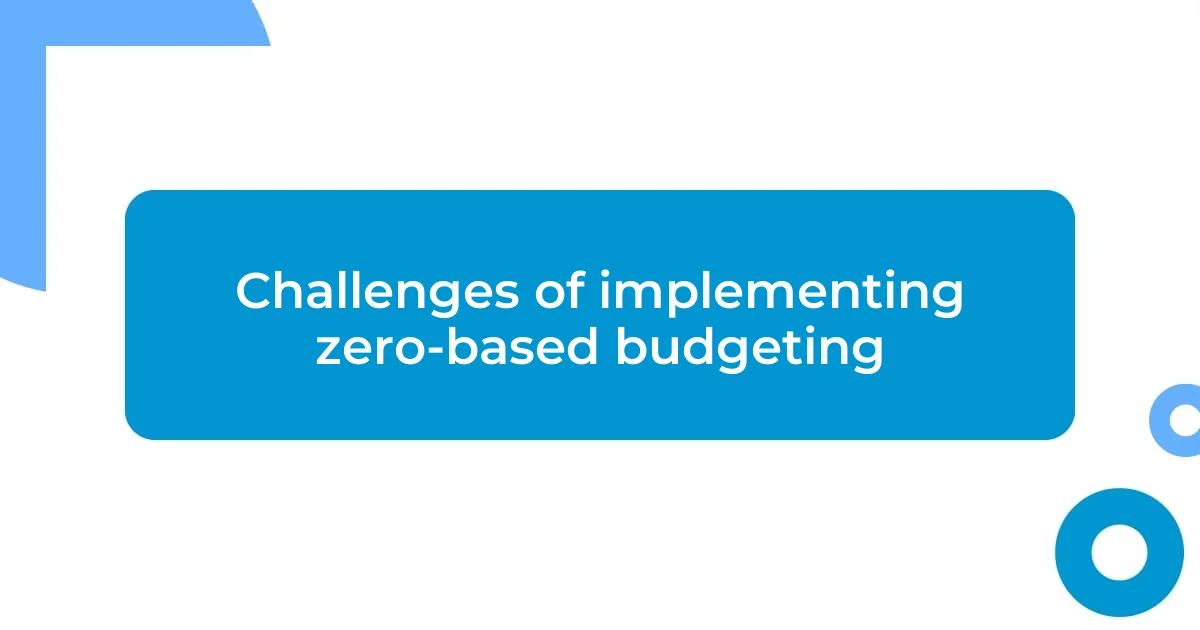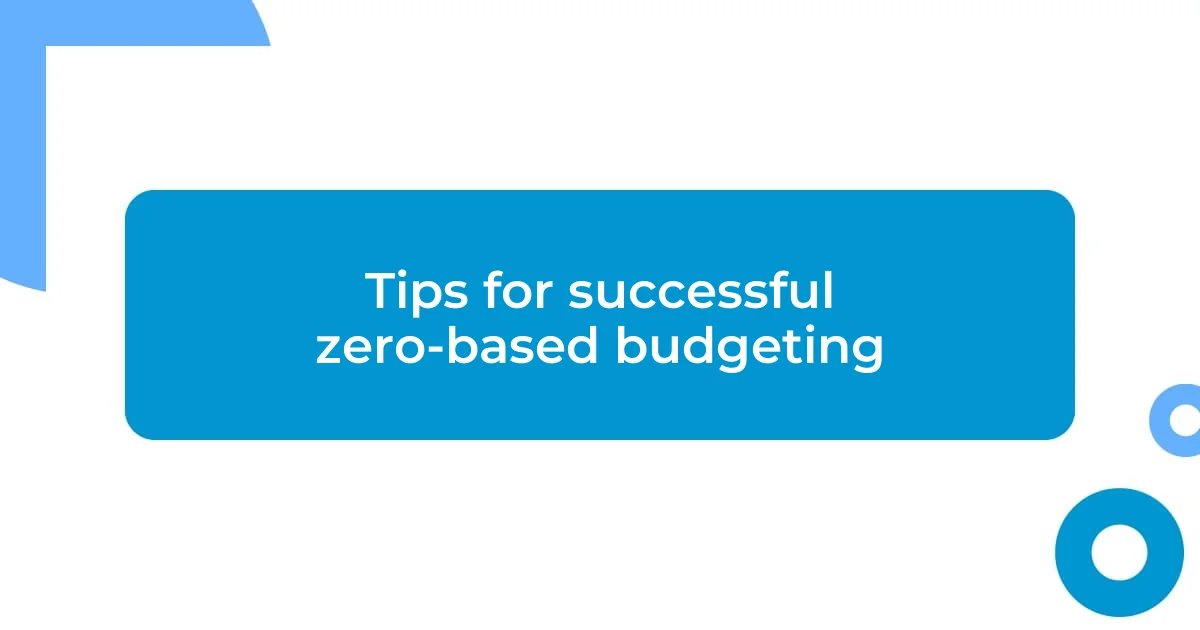Key takeaways:
- Zero-based budgeting (ZBB) allows for a comprehensive evaluation of all expenses, fostering intentional spending and financial clarity.
- The main benefits of ZBB include enhanced clarity of financial allocation, prioritization of essential expenses, and promotion of fiscal discipline.
- Key challenges of ZBB are time consumption, resistance to change, the potential for over-analysis, and maintaining alignment with financial goals.

Understanding zero-based budgeting
Zero-based budgeting (ZBB) revolves around building your budget from scratch every period, rather than simply adjusting the previous one. I remember my first encounter with this method—it felt enlightening yet daunting. It pushed me to evaluate every expense critically. Have you ever wondered how much of your budget is truly necessary? This method unveils just that.
One of the standout features of zero-based budgeting is that every dollar must be justified. When I adopted ZBB, I started asking myself hard questions about my spending habits. I noticed a shift in my mindset; instead of mindlessly shelling out cash, I became more intentional. It’s a fascinating experience trying to prioritize needs over wants.
Another emotional insight is the empowerment that comes with ZBB. As I meticulously reviewed my financial goals, I felt in control like never before. It fosters a sense of ownership over your finances. Have you ever felt that rush of clarity when you actually know where your money is going? It can be life-changing.

Benefits of zero-based budgeting
One of the most significant benefits of zero-based budgeting is its ability to create clarity in financial decision-making. When I first embraced ZBB, I found that I could truly understand the impact of each expense on my overall financial health. It was like switching on a light in a dimly lit room; everything became clearer, and I could finally see where my money was going. This level of awareness made it easier for me to pinpoint areas where I could cut back and save more.
Another compelling advantage is the enhanced prioritization it offers. During my journey with ZBB, I realized how often I had allowed convenience to dictate my spending. By assessing my budget from a zero base, I started prioritizing essential expenses over non-essentials. I vividly remember cutting back on unnecessary subscriptions and redirecting that money towards my savings goals. What a game changer!
Lastly, zero-based budgeting promotes fiscal discipline, which I believe is crucial for long-term financial success. I noticed this discipline manifest when I began setting specific goals for every dollar allocated. By regularly evaluating my spending within each category, I was less likely to indulge in impulse purchases. It’s a feeling of triumph when I can say no to something I don’t really need. Wouldn’t you agree that developing this discipline is invaluable?
| Benefit | Description |
|---|---|
| Clarity | Provides detailed visibility into where money is allocated. |
| Prioritization | Encourages spending on what truly matters while eliminating waste. |
| Fiscal Discipline | Promotes thoughtful spending and saving habits over time. |

Challenges of implementing zero-based budgeting
Implementing zero-based budgeting (ZBB) can be surprisingly challenging, even for seasoned finance enthusiasts. When I first dove into it, I quickly realized that tackling every expense from square one requires more than just careful thought; it demands persistent commitment. I remember feeling overwhelmed when it came to justifying even the smallest expenditures. It’s an ongoing battle against ingrained spending habits and the emotional fatigue that comes with constant scrutiny.
The demands of zero-based budgeting can lead to several identifiable challenges, including:
– Time-Consuming Process: It requires significant time and effort to justify each line item, making it difficult to maintain in the long run.
– Resistance to Change: Both individuals and teams might resist getting accustomed to new budgeting practices, creating friction.
– Over-Analysis Paralysis: There’s a risk of getting caught in endless evaluations, stifling timely financial decisions.
– Misalignment of Goals: Without clear priorities, teams can struggle to align their spending strategies with overarching objectives.
I once found myself second-guessing every minor purchase, feeling a mix of empowerment and anxiety. It’s fascinating how a budgeting approach that aims for transparency can also induce a sense of financial paranoia. Balancing analysis with action became essential for me to prevent burnout. That’s something I think we should all consider when adapting to ZBB—it’s crucial to find that sweet spot where efficient spending meets mental well-being.

Tips for successful zero-based budgeting
To ensure successful zero-based budgeting, the first tip is to stay organized. I’ve found that creating a detailed spreadsheet or using budgeting software allows for clarity and structure. When I categorize my expenses systematically—like housing, groceries, and entertainment—I not only see where I stand financially, but I can also spot any unnecessary spending. Do you ever wonder how much easier budgeting could be with a bit of organization?
Next, I emphasize the importance of reviewing your budget regularly. I learned that taking the time to review and adjust my budget monthly keeps me aligned with my financial goals. It’s a simple yet effective practice. When I carve out this time, I’m able to reflect on my priorities and adapt to any changes in my income or spending. What have you discovered about your own spending habits when you take the time to reflect?
I also recommend setting clear, actionable goals for your budget. When I first adopted zero-based budgeting, I felt aimless without specific targets, but once I started defining goals—whether saving for a vacation or paying off debt—I felt more motivated to stick to my plan. Those tangible aspirations helped me make informed decisions about spending. By knowing what I was working towards, I could resist temptations that would derail my progress. How do you think having defined goals might change your approach to budgeting?














